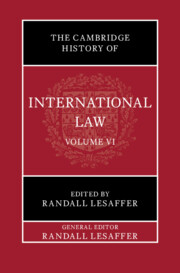Book contents
- The Cambridge History of International Law
- The Cambridge History of International Law
- Frontispiece
- The Cambridge History of International Law
- Copyright page
- Contents
- Plates
- Contributors
- Preface
- Abbreviations
- Part I International Law in Renaissance Europe (1492–1660)
- Part II International Law in Old Regime Europe (1660–1775)
- 12 The Law of Nations in Old Regime Europe
- 13 Territory and Jurisdiction in Old Regime Europe
- 14 The Law of the Sea in Old Regime Europe
- 15 War and the Use of Force in Old Regime Europe
- 16 Warfare on land in Old Regime Europe
- 17 Maritime Warfare in Old Regime Europe
- 18 Peacemaking in Old Regime Europe
- 19 Trade in Old Regime Europe
- 20 Diplomacy in Old Regime Europe
- 21 Dispute Settlement in Old Regime Europe
- 22 The Ottoman Encounter and the Law of Nations in the Old Regime
- Index
- Plate Section (PDF Only)
- References
15 - War and the Use of Force in Old Regime Europe
from Part II - International Law in Old Regime Europe (1660–1775)
Published online by Cambridge University Press: 22 April 2025
- The Cambridge History of International Law
- The Cambridge History of International Law
- Frontispiece
- The Cambridge History of International Law
- Copyright page
- Contents
- Plates
- Contributors
- Preface
- Abbreviations
- Part I International Law in Renaissance Europe (1492–1660)
- Part II International Law in Old Regime Europe (1660–1775)
- 12 The Law of Nations in Old Regime Europe
- 13 Territory and Jurisdiction in Old Regime Europe
- 14 The Law of the Sea in Old Regime Europe
- 15 War and the Use of Force in Old Regime Europe
- 16 Warfare on land in Old Regime Europe
- 17 Maritime Warfare in Old Regime Europe
- 18 Peacemaking in Old Regime Europe
- 19 Trade in Old Regime Europe
- 20 Diplomacy in Old Regime Europe
- 21 Dispute Settlement in Old Regime Europe
- 22 The Ottoman Encounter and the Law of Nations in the Old Regime
- Index
- Plate Section (PDF Only)
- References
Summary
This chapter explores the justification and legitimisation of war and ‘imperfect’ uses of force both in legal scholarship and diplomatic practice. The Grotian synthesis of ‘just’ and ‘formal’ war entered mainstream scholarship and reached its full explanatory force in the work of Vattel. The resilience of just war in the face of its impracticality among sovereign state in scholarship can, among other, be explained by the fact that the subtle interplay of two conceptions of law in fields of legal application - , gelled well with diplomatic practice. Whereas states applied the jus in bello and jus post bellum with regards to claims to the justice of the war, the just war doctrine remained a common discourse for the justification of resort to war and force and added an instrument to the toolbox of alliances diplomacy.
- Type
- Chapter
- Information
- The Cambridge History of International Law , pp. 495 - 516Publisher: Cambridge University PressPrint publication year: 2025

